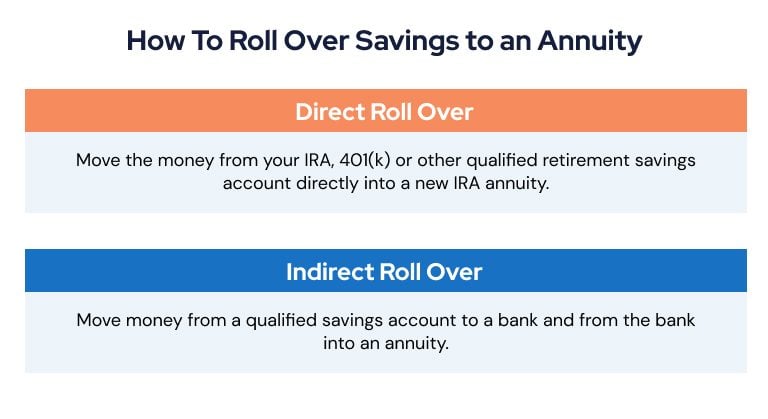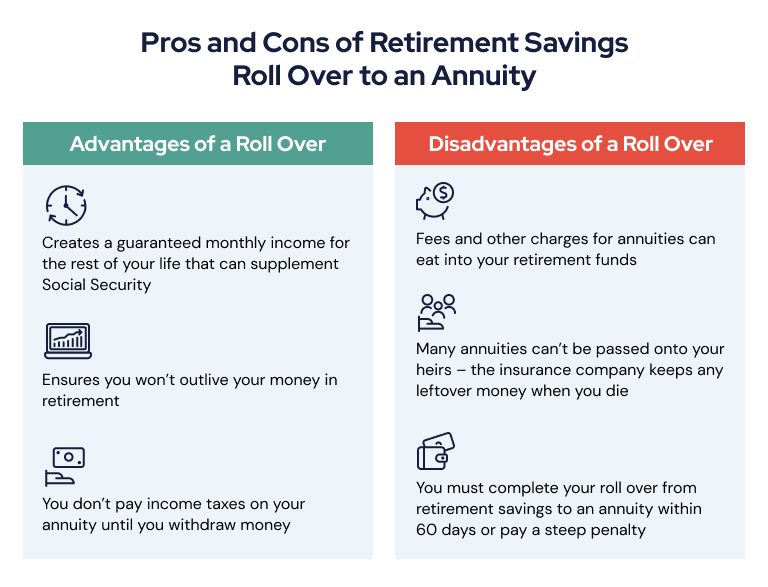Can I Roll Over My Annuity Into a a 401k
Can I Roll My IRA or 401(k) Into an Annuity?
Rolling over your individual retirement account (IRA) or 401(k) into an annuity creates an IRA annuity – a type of qualified annuity. You can do this through an insurance company, depositing your funds – tax-free – directly into the new annuity or you can have your employer roll over your 401(k) into the IRA annuity.
Why Roll Over Retirement Savings Into an Annuity?
Rolling over a lump sum of your retirement savings annuity turns the money into a guaranteed lifetime income.
You can roll over several different types of retirement savings into an annuity, including:
If you decide to roll over your savings, you'll need to make a series of decisions that will affect how you'll receive payments from your annuity, how you'll grow your investment and what happens to your investment when you die.
Three Steps to Choosing the Right Annuity
- Choose your payouts
- You have two annuity options – deferred annuities or immediate annuities. You typically buy a deferred annuity before you retire, using it to grow your money. You won't pay taxes on this growth until you withdraw money from it. Immediate annuities are a better option if you're close to retirement – you make one lump sum contribution and you have an immediate income stream for the rest of your life.
- Grow your investment
- You have three options – fixed annuity, variable annuity or indexed annuity. A fixed annuity lets your money grow at a steady and guaranteed rate over the term you select. A variable or indexed annuity will be tied to underlying investments. The rate of growth depends on fluctuations in those indexes or other investments. Typically, indexed annuities have more risk and more potential return than a fixed annuity, but less risk and less potential return than a variable annuity.
- Death benefits
- Not all annuities have death benefits. Some may turn over any remaining money to the insurance company that issued it when you die. If you want to pass on the money left in the annuity, you will need to name a beneficiary. The death benefit may be taxable. Discuss this thoroughly with the insurer when choosing an annuity.
Stress-Free Annuity Buying
Our financial experts can guide you through the annuity buying process so you can focus on your retirement, asset protection or income generation.
How Does the Roll Over Process Work?
There are two ways to roll over your retirement savings to an annuity – through a direct roll over or an indirect roll over.

Direct roll overs can avoid tax implications and possible penalties. They can also meet Internal Revenue Service (IRS) requirements for required minimum distributions (RMDs).
An RMD can kick in when you turn 72. That's when you are required to begin taking out a certain percentage of your pretax retirement savings each year. The rule doesn't apply to IRA annuities.
Pros and Cons of Rolling Over Your Retirement Savings Into an Annuity
Rolling over your retirement savings into a qualified annuity has advantages including the sense of security of a guaranteed lifetime income. But you should also consider some of the drawbacks such a roll over includes before making this move part of your retirement plan.

There are several points to consider before deciding whether to roll over your retirement savings into an annuity. These include the type of annuity you select and the fees that go along with it.
Variable annuities usually come with higher fees than fixed annuities. This is because variable annuities typically require more hands-on management. This extra effort can cost you up to three percent more a year than fixed annuity fees.
How Much Money Should You Roll Over?
Ideally, you'll want to roll over enough of your retirement savings to meet your specific needs and financial goals.
You want it to be enough to generate a lifetime income that continues to cover your daily expenses. You'll want to factor in inflation and how much of your expenses are covered by other retirement income sources such as Social Security or pension payments.
Talking with a licensed financial professional can help you determine what you will need to produce a steady retirement income. They can use that to help you decide how much you should roll over into a qualified annuity.
Tax Implications of Rolling Over Retirement Savings to an Annuity
Tax implications for rolling over your retirement savings into an annuity depend on the type of retirement savings plan you have and how quickly you complete the retirement plan roll over transaction.
Tax Implications for Roll Overs Into Annuities
- Rolling over a 401(k) or traditional IRA
- There should be no tax impact so long as the roll over is completed in 60 days. Deposits into these savings plans are tax deferred – meaning you don't pay income taxes until you withdraw the savings. In this case, the annuity would work the same as your retirement account, so the roll over does not count as a withdrawal.
- Rolling over a Roth IRA or Roth 401(k)
- Money you place in a Roth IRA is not tax deferred – you pay income taxes on the money before depositing it in the Roth IRA. You will roll over your savings into a Roth IRA annuity. You will not have to pay income taxes on money you withdraw money from the annuity.
- Roll over deadlines
- The most serious implication is if you miss the roll over deadline. Once you start the roll over, you must complete it within 60 days. Miss that deadline and you'll have to forfeit 20 percent of your balance to the IRS.
While investments in an annuity are tax deferred until you withdraw money from it, IRAs, 401(k)s and other retirement savings plans typically offer the same or similar tax advantages. You may want to talk with a tax professional about additional tax benefits you might receive from a roll over in your case.
Last Modified: November 1, 2021
Can I Roll Over My Annuity Into a a 401k
Source: https://www.retireguide.com/retirement-planning/investing/accounts/ira-401k-annuity-rollover/
0 Response to "Can I Roll Over My Annuity Into a a 401k"
Post a Comment